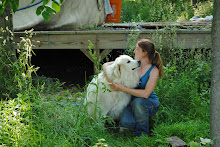I’ve never been a big fan of traditional signs of love and commitment: flowers, rings, buying a dog together. Instead, Andrew and I bought a veal calf and a chest freezer.
This is the culmination of my quest, begun one year ago, to confront my own questions about the appropriateness of eating meat. I’ve had my doubts, guilty moments in between the ecstasy of bacon and a heaping portion of Thanksgiving turkey. But I always deferred my uncertainty by vowing to give the issue more thought—someday—later—when I had more control over my plate.
And eventually that day came. Last year, at Serenbe, we raised meat chickens, and I learned the tricks of a quick kill and a clean evisceration. I surprised myself by my lack of squeamishness after the first lightheaded moments of slaughter. My actions had purpose and continuity. I felt not guilt but gratitude. Honestly, though, participating in a chicken slaughter is not particularly hard on the emotions. It is easy to view chickens as something close to a crop; indeed, a flock of Cornish Cross broilers can be raised to slaughter weight in less time than it takes to grow a tomato.
Cows are an entirely different story. Here at Caretaker, we name our cows: Lucy and Lukey, the beef cow mamas, Albert and Rusty, their offspring (and future beef steers), Chloe, dairy cow and queen of the farm, and Jingle Bells, Chloe’s male Jersey calf. They are endearing. They have personalities. And in the case of Jingle Bells, we helped shepherd him into the world. Don pulled; Chloe strained; the slick little spindly calf fell out onto the hay, and we all released breaths we hadn’t realized we were holding.
Once we recognized his sex, however, his fate was sealed. A functioning farm does not have room for purposeless beasts, either human or animal. Just as we will rise each morning and tend to the crops and chores, the animals must earn their keep. Barn cats are mousers, chickens lay eggs, Chloe gives milk, and a male cow can only, unfortunately, be meat. We had hoped for a heifer calf, which we could raise up and sell to be someone else’s dairy cow, but the chromosome lottery had other plans.
Why not keep Jingle Bells, or at least raise him up to be a two-year-old steer? As a Jersey calf, rather than an Angus or a Hereford, for example, he would never put on the weight to justify the hay he would eat all winter long. Additionally, Jersey genetics, which give their milk its richness and their butter its golden color, would render his fat an unappetizing yellow, were he to grow to maturity..
His purpose could only be meat, and in that we tried to value and respect him. So he lived with his mother every day on pasture. He drank his fill of milk (occasionally more than his fill, perhaps), and sometimes liked to race us down the hill. Probably, if cows had any concept of the arithmetic of domestication, they would not have chosen to live so closely with us. But then again, perhaps they would. Chloe seems none the worse for the loss of her calf. She likes people and the treats that they bring her. She trots up when you call and still plots ways to eat pumpkins.
As for me, I am at peace with the contents of our extremely retro freezer. My meat was not a disembodied commodity, but a piece of this farm, which I dearly love.
Subscribe to:
Post Comments (Atom)




1 comment:
Beautiful post, MK. I ate veal testicles at H+F the other night, which was an... interesting experience.
Can't wait to see you next month!
Post a Comment